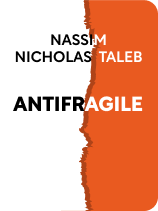

This article is an excerpt from the Shortform book guide to "Antifragile" by Nassim Nicholas Taleb. Shortform has the world's best summaries and analyses of books you should be reading.
Like this article? Sign up for a free trial here .
What is Antifragile about? What’s its meaning and why is it so important?
Antifragile is the title of a book by Nassim Nicholas Taleb. It discusses the idea of antifragility, a concept that’s sort of a combination of durability and resilience. It says that stress and turmoil can and should make us stronger.
Read about Antifragile, its meaning, and more.
What Is Antifragility?
Antifragile is the fourth book in former options trader Nassim Nicholas Taleb’s five-book Incerto series, which explores randomness and its unpredictable effects. In this book, Taleb discusses strategies and principles that will allow us to be helped by unforeseen events rather than harmed by them.
People often think that the opposite of fragility is durability. If something is fragile, that means it’s easily broken. Therefore, if something isn’t easily broken, logically that should mean it’s the opposite of fragile. However, there’s another step beyond durability: something that actually gets stronger under stress. Since there isn’t an established English word for such a thing, let’s call it antifragility—not just the lack of fragility, but its true opposite.
Antifragile discusses:
- What antifragility is
- Why antifragility is necessary in all aspects of life
- Sources of fragility and antifragility
- Strategies to avoid fragility and seek antifragility
- Short-term versus long-term stability and why the latter depends on antifragility
- The ethical components of fragility and antifragility
Antifragile Meaning
But what is antifragile’s meaning? The fact that there’s nothing in the dictionary to describe antifragility doesn’t stop us from experiencing and using it in our everyday lives. For instance, every time we exercise, damaging our muscles so that they’ll become stronger, we’re taking advantage of our inherent antifragility.
To truly understand the difference between fragility, durability, and antifragility, consider some figures from mythology. First, in the tale of Damocles, the titular character is seated at a feast with a sword hanging over him. The sword is suspended from the ceiling by a single horsehair. This is fragility: It’s only a matter of time before that hair breaks and Damocles dies.
Now think about the phoenix, the legendary bird that’s reborn from its own ashes after it dies. This is durability: No matter what happens to it, the phoenix will always return to the same state as before.
Finally, consider the hydra, a monster from ancient Greek mythology that grows back two heads if one is cut off. Unlike the phoenix, which is reborn into an identical body, the hydra actually gets stronger by being hurt. This is antifragility.
While each book in Taleb’s Incerto series can be read on its own, they have some common themes and build on one another. In particular, Antifragile builds on ideas from The Black Swan, which is about the unexpectedly large impact of unpredictable and unlikely events. Antifragile teaches us how to turn such events to our advantage.
(Shortform note: You can read our summary of The Black Swan here.)
Why We Need Antifragility
We live in an unpredictable world. The models and theories we use to try to predict the future invariably fall apart as unforeseen events prove them wrong and, in turn, destroy the plans we made based on those models. Clearly, systems based on such flawed models are bound to be fragile—easily broken.
The solution to this problem is antifragility. Instead of a never-ending search for more accurate models and better predictions, all we need to do is make sure that we’re in a position to benefit from uncertainty and volatility instead of being harmed by it.
This is hardly a new concept; nature exhibits antifragility in nearly everything she creates. An organism can strengthen itself through minor damage in the form of exercise, while a species can strengthen itself through minor damage in the form of natural selection, which leads to evolution.
However, unlike nature, humans try to control the world through models and rules. We think we can perfectly predict the future and avoid any shocks that would cause our fragile systems to fall apart. We think we can outsmart millions of years of evolution and antifragility, and we’re almost invariably wrong.
Instead of trying to predict the future, we should assume that there will be major events we can’t see coming—because, sooner or later, there will be. If we’re prepared for them, using the methods and practices explained in this book, we can make sure that such events work to our advantage instead of hurting us. By avoiding fragility and embracing antifragility wherever possible, we can set ourselves up to thrive in an uncertain world.

———End of Preview———
Like what you just read? Read the rest of the world's best book summary and analysis of Nassim Nicholas Taleb's "Antifragile" at Shortform .
Here's what you'll find in our full Antifragile summary :
- How to be helped by unforeseen events rather than harmed by them
- Why you shouldn't get too comfortable or you'll miss out on the chance to become stronger
- Why you should keep as many options available to you as possible






